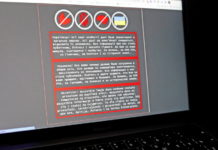Multiple blockades at some of the busiest routes linking Canada to the United States are disrupting supply chains of major car companies, leading to production stoppages and fanning alarm that protests in Canada are threatening the country’s economy and trade with the United States, its biggest trading partner.
Automakers, who have already been suffering from a global shortage of semiconductors needed to power their cars, are being particularly affected by the partial shutdown of the Ambassador Bridge, which links Detroit, Mich., with Windsor, Ontario, and accounts for roughly a quarter of the trade between the two countries.
Trucks make thousands of trips across the bridge each day in both directions, carrying $300 million worth of goods, about a third of which are related to the automobile industry, a major employer across the Midwest and Ontario.
The blockades are a spillover from demonstrations in Canada’s capital of Ottawa, which began nearly two weeks ago when loosely organized groups of truck drivers and others converged on the city to protest vaccination requirements for truckers crossing into Canada from the United States. In addition to the blockades, the protests have morphed into a battle cry against pandemic restrictions in general and the leadership of Prime Minister Justin Trudeau.
With protests in Ottawa and blockades in other parts of Ontario, the protests have presented a challenge to stretched law enforcement trying to tame them. On Thursday, Ottawa police also warned on Twitter that its 911 lines were being inundated with nonurgent calls. “This puts lives in danger and is totally unacceptable,” it wrote on Twitter.
Local news reports also said that a group of protesters had gone to Ottawa International Airport on Thursday morning, honking horns and driving around the airport.
As the border blockades in Ontario continued, Said Deep, a spokesman at Ford Motor Company, said Thursday morning that the company was currently running its plants in Oakville and Windsor at reduced capacity.
“This interruption on the Detroit-Windsor bridge hurts customers, autoworkers, suppliers, communities and companies on both sides of the border that are already two years into parts shortages resulting from the global semiconductor issue, Covid and more,” Mr. Deep said. “It could have widespread impact on all automakers in the U.S. and Canada.”
Scott Vazin, a spokesman at Toyota, said the shutdown at the border would prevent the company from being able to manufacture anything at its three Canadian plants for the rest of this week. But he said the overall impact on the company’s business would be limited.
“A couple of days shouldn’t be that significant,” he said. “We’re certainly hoping the blockade ends.”
G.M. said it had canceled two shifts on Wednesday and Thursday at a factory in Lansing, Mich., that makes sport utility vehicles.
On Wednesday night, protesters also swarmed the Ambassador Bridge entrance to the United States from Windsor, effectively closing it in both directions, the Canadian Broadcasting Corporation, Canada’s national broadcaster, reported.
In a briefing Wednesday, Jen Psaki, the White House press secretary, said that the blockade posed a risk to auto industry supply chains, and that the administration was also tracking potential disruptions to agricultural exports from Michigan into Canada.
Omar Alghabra, Canada’s transport minister, called for an end to what he described as “illegal blockades” amid suggestions that the Ontario government rein in the protesters by revoking permits for commercial vehicles.
In Toronto, Canada’s largest city and financial center, the police on Wednesday closed roads in the downtown area before a possible truck convoy after seeing social media posts that protests were heading to Toronto. The police blocked off roads surrounding the provincial legislature building, repeating precautions they took before protests last weekend.
Some in the Ottawa protests have clearly been on the fringe, wearing Nazi symbols and desecrating public monuments. Others have also described themselves as ordinary Canadians driven to take to the streets by desperation.
Far-right and anti-vaccine groups around the world have amplified the message of the Canadian protesters on social media, raising millions of dollars in online campaigns. The protests have also inspired copycat convoys in France, New Zealand and Australia.
Paris police officials on Thursday issued an order banning a convoy of truckers and drivers heading to the French capital to protest against the country’s vaccination pass program, as part of a movement directly inspired by Canada’s trucker-led protests.
In Canada, Mr. Trudeau has faced a barrage of criticism from opposition politicians, including the contention that overzealous restrictions are keeping Canada in a state of a permanent pandemic, and that he has been too passive in the face of the protests undermining Canada’s image on the global stage.
But in a sign of intensifying impatience with the protests, even among former political supporters, Candice Bergen, interim leader of the Conservative Party, on Thursday called for the protesters to “take down the barricades,” citing disruptions to the economy.
Constant Méheut contributed reporting.
Source : Nytimes













